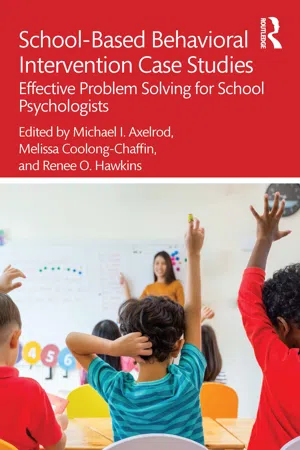
School-Based Behavioral Intervention Case Studies
Effective Problem Solving for School Psychologists
- 334 pages
- English
- ePUB (mobile friendly)
- Available on iOS & Android
School-Based Behavioral Intervention Case Studies
Effective Problem Solving for School Psychologists
About this book
School-Based Behavioral Intervention Case Studies translates principles of behavior into best practices for school psychologists, teachers, and other educational professionals, both in training and in practice. Using detailed case studies illustrating evidence-based interventions, each chapter describes all the necessary elements of effective behavior intervention plans including rich descriptions of target behaviors, detailed intervention protocols, data collection and analysis methods, and tips for ensuring social acceptability and treatment integrity. Addressing a wide array of common behavior problems, this unique and invaluable resource offers real-world examples of intervention and assessment strategies.
Tools to learn more effectively

Saving Books

Keyword Search

Annotating Text

Listen to it instead
Information
1
Introduction
Introduction
Table of contents
- Cover
- Half Title
- Title Page
- Copyright Page
- Dedication
- Table of Contents
- List of Figures
- List of Tables
- List of Contributors
- Acknowledgments
- Chapter 1: Introduction
- Chapter 2: Differential Reinforcement
- Chapter 3: Token Economy
- Chapter 4: Time-Out
- Chapter 5: Premack’s Principle and Visual Schedules
- Chapter 6: Video Modeling
- Chapter 7: Behavioral Skills Training and Positive Practice
- Chapter 8: Behavioral Momentum
- Chapter 9: Response Effort and Overcorrection
- Chapter 10: Response Cost Raffle and Mystery Motivator
- Chapter 11: Self-Monitoring
- Chapter 12: Cognitive Behavioral Therapy
- Chapter 13: Exposure Therapy
- Chapter 14: Behavioral Activation
- Chapter 15: Good Behavior Game
- Chapter 16: Timely Transitions Game
- Chapter 17: Positive Peer Reporting
- Chapter 18: Color Wheel
- Chapter 19: Check-In Check-Out/Behavior Report Card
- Chapter 20: Social StoriesTM
- Chapter 21: Functional Analysis
- Index
Frequently asked questions
- Essential is ideal for learners and professionals who enjoy exploring a wide range of subjects. Access the Essential Library with 800,000+ trusted titles and best-sellers across business, personal growth, and the humanities. Includes unlimited reading time and Standard Read Aloud voice.
- Complete: Perfect for advanced learners and researchers needing full, unrestricted access. Unlock 1.4M+ books across hundreds of subjects, including academic and specialized titles. The Complete Plan also includes advanced features like Premium Read Aloud and Research Assistant.
Please note we cannot support devices running on iOS 13 and Android 7 or earlier. Learn more about using the app